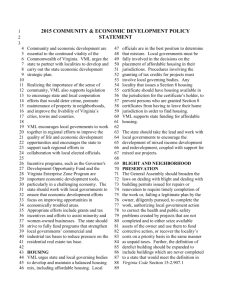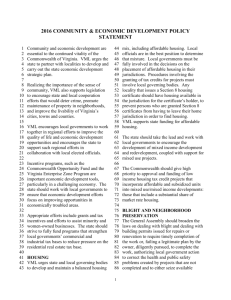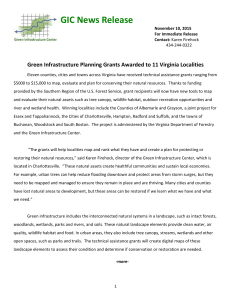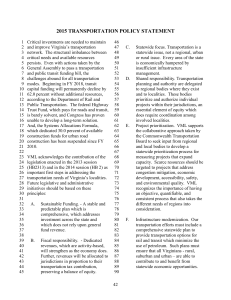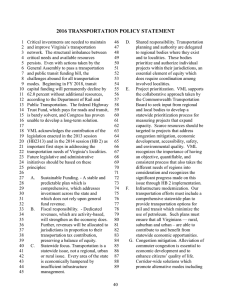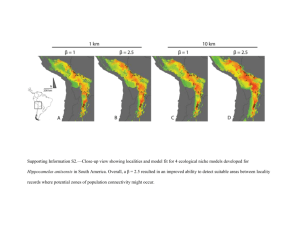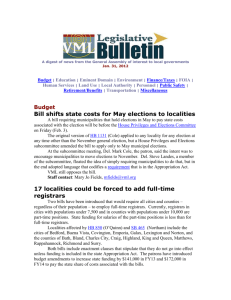2016 Draft General Laws Policy Statement
advertisement
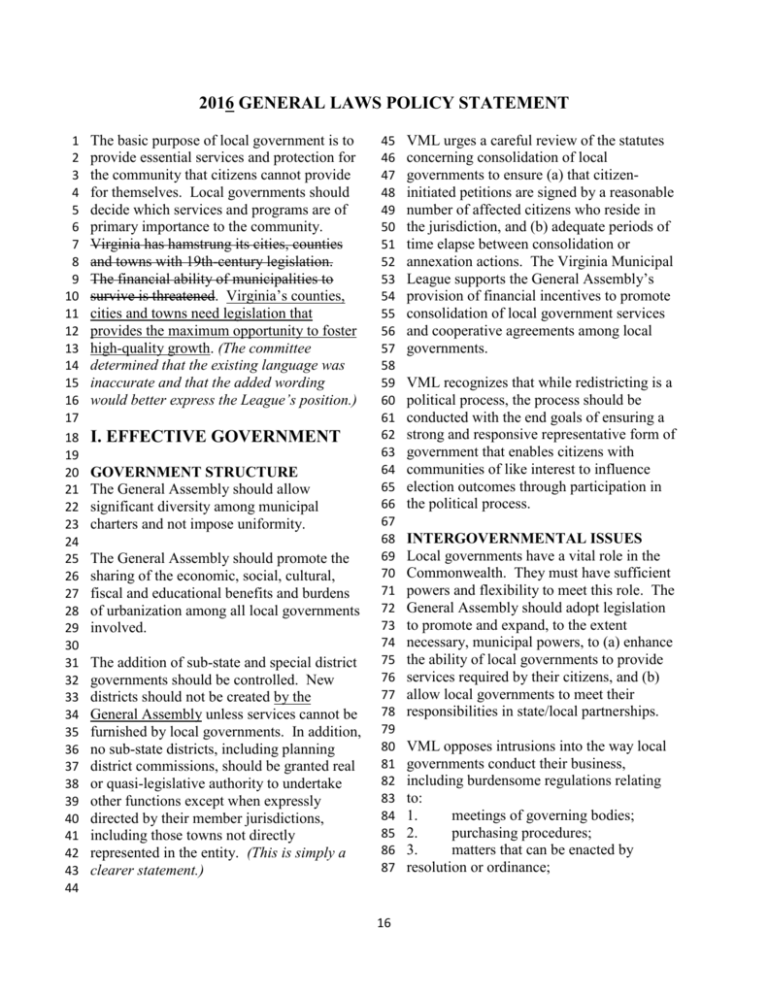
2016 GENERAL LAWS POLICY STATEMENT 1 2 3 4 5 6 7 8 9 10 11 12 13 14 15 16 17 18 19 20 21 22 23 24 25 26 27 28 29 30 31 32 33 34 35 36 37 38 39 40 41 42 43 44 The basic purpose of local government is to provide essential services and protection for the community that citizens cannot provide for themselves. Local governments should decide which services and programs are of primary importance to the community. Virginia has hamstrung its cities, counties and towns with 19th-century legislation. The financial ability of municipalities to survive is threatened. Virginia’s counties, cities and towns need legislation that provides the maximum opportunity to foster high-quality growth. (The committee determined that the existing language was inaccurate and that the added wording would better express the League’s position.) I. EFFECTIVE GOVERNMENT GOVERNMENT STRUCTURE The General Assembly should allow significant diversity among municipal charters and not impose uniformity. The General Assembly should promote the sharing of the economic, social, cultural, fiscal and educational benefits and burdens of urbanization among all local governments involved. The addition of sub-state and special district governments should be controlled. New districts should not be created by the General Assembly unless services cannot be furnished by local governments. In addition, no sub-state districts, including planning district commissions, should be granted real or quasi-legislative authority to undertake other functions except when expressly directed by their member jurisdictions, including those towns not directly represented in the entity. (This is simply a clearer statement.) 45 46 47 48 49 50 51 52 53 54 55 56 57 58 59 60 61 62 63 64 65 66 67 68 69 70 71 72 73 74 75 76 77 78 79 80 81 82 83 84 85 86 87 16 VML urges a careful review of the statutes concerning consolidation of local governments to ensure (a) that citizeninitiated petitions are signed by a reasonable number of affected citizens who reside in the jurisdiction, and (b) adequate periods of time elapse between consolidation or annexation actions. The Virginia Municipal League supports the General Assembly’s provision of financial incentives to promote consolidation of local government services and cooperative agreements among local governments. VML recognizes that while redistricting is a political process, the process should be conducted with the end goals of ensuring a strong and responsive representative form of government that enables citizens with communities of like interest to influence election outcomes through participation in the political process. INTERGOVERNMENTAL ISSUES Local governments have a vital role in the Commonwealth. They must have sufficient powers and flexibility to meet this role. The General Assembly should adopt legislation to promote and expand, to the extent necessary, municipal powers, to (a) enhance the ability of local governments to provide services required by their citizens, and (b) allow local governments to meet their responsibilities in state/local partnerships. VML opposes intrusions into the way local governments conduct their business, including burdensome regulations relating to: 1. meetings of governing bodies; 2. purchasing procedures; 3. matters that can be enacted by resolution or ordinance; 1 2 3 4 5 6 7 8 9 10 11 12 13 14 15 16 17 18 19 20 21 22 23 24 25 26 27 28 29 30 31 32 33 34 35 36 37 38 39 40 41 42 43 44 45 46 4. procedures for adopting ordinances; and 5. procedures for filling vacancies on local governing bodies. State intervention in local affairs is only warranted in significant matters where regional or statewide issues that are of great importance exist. No changes should be made in the laws affecting local government without substantial local input from affected jurisdictions and participation in developing those changes. VML opposes legislation that: • bars courts from awarding attorney’s fees to local governments when a frivolous suit is filed; • eliminates the notice of claim requirement found in Va. Code, § 15.2-209. Membership on all state and regional commissions or committees dealing with matters affecting local governments must include local officials who represent a demographic and geographic cross-section of counties, cities, and towns. VML supports legislation to transfer responsibility from local governments to the state government for the liability, administration and cost of community service options for persons upon whom court costs and fines are levied. TOWNS The General Assembly and the executive branch should recognize towns as essential units of local government, with important roles in providing services to citizens living in a concentrated environment. As such, towns with their centrality and economic efficiency represent the future of the urbanizing areas of the Commonwealth. Towns should have clear and full authority to be formed and to act in a timely manner 47 48 49 50 51 52 53 54 55 56 57 58 59 60 61 62 63 64 65 66 67 68 69 70 71 72 73 74 75 76 77 78 79 80 81 82 83 84 85 86 87 88 89 90 91 17 on matters which protect public health, safety, and welfare. The General Assembly should respect and support the sovereignty, utility, and urban powers of towns. No legislation should be enacted that allows counties to usurp or diminish the authorities of towns. Excise taxes that counties are authorized to levy generally must not apply within towns without the explicit approval by the town’s governing body. The General Assembly should scrutinize bills dealing with laws of general applications to local governments, to avoid enacting any laws that would be sources of possible conflicts between counties and towns. The following list provides examples of conflicts between towns and counties exacerbated by legislative action: a. taxation of town residents by county governments at the same rate as that applied to those living in the county’s unincorporated areas, when comparable benefits and services are not provided; b. county imposition of a merchants’ capital tax on businesses located within the town at the same rate as that applied to businesses located in unincorporated areas of the county, when the town levies a business, professional and occupational license tax; c. unequal town zoning and planning authority for land straddling or abutting town corporate boundaries and unincorporated county areas; d. funding of county sheriffs’ and deputy sheriffs’ salaries by the State Compensation Board and other state-funded amenities not provided to town police departments; and e. unequal statutory authority of towns in relationship to that of cities and counties. 1 2 3 4 5 6 7 8 9 10 11 12 13 14 15 16 17 18 19 20 21 22 23 24 25 26 27 28 29 30 31 32 33 34 35 36 37 38 39 40 41 42 43 44 45 46 f. allowing county excise tax within a town without approval of the town government. The General Assembly should recognize the unintended consequences of inadvertently omitting towns or cities or counties from legislation. The state laws on local taxes must allow towns to determine how tax dollars collected from residents and businesses of the town will be used. Towns should retain the right to annex lands and otherwise expand their boundaries. Towns over 5,000 population should have the right to become an independent city; and cities should have the right to revert to town status. STATE AND FEDERAL MANDATES The state and federal governments must provide adequate funding for any local programs or responsibilities that are mandated or expanded by state and federal laws or regulations. The federal and state governments should not use project funding as a means of forcing local land use decisions in contravention to local land use plans. These actions violate the principles of local authority and weaken the local tax base. Federal and state mandates must be reduced when funding is reduced, so that localities are not required to spend additional local dollars to comply with the mandates. Further, funds should be distributed in the most efficient way possible with the least regulatory control. The Governor and General Assembly should promote state-local partnerships by requiring: 1. A review of mandates in specific program areas to (a) establish the full cost to 47 48 49 50 51 52 53 54 55 56 57 58 59 60 61 62 63 64 65 66 67 68 69 70 71 72 73 74 75 76 77 78 79 80 81 82 83 84 85 86 87 88 89 90 91 92 18 local governments of implementing mandates and (b) develop an appropriate basis for determining state-local funding responsibilities. 2. Completion of cost estimates for proposed legislation prior to its first full review by a legislative committee, with legislation negatively affecting local governments’ revenue-raising ability being submitted to the COLG for a fiscal impact analysis. 3. A performance-based approach to mandates that (a) focuses on outcomes, (b) offers incentives for achieving state objectives, and (c) gives local governments autonomy to determine the best way to achieve the desired result. 4. Simplified state reporting requirements associated with mandates eliminating nonessential information and duplication, coordinating state deadlines for information submittal, and making better use of reporting technology. The alarming tendency of state and federal agencies to treat guidelines authorized by enabling legislation as having the stature of law itself must cease. In addition, the state should avoid unessential and arbitrary implementation of federal regulations. STATE AND LOCAL RESPONSIBILITIES The state requires local governments to provide certain services, such as education, corrections, social services, health and community mental health. The local government does not have the option of not being the state’s service provider in these areas. “State aid” to localities is the state’s payment for the implicit contractual arrangement for this assignment of duties. In addition, local governments have to contribute local funding to these services. In addition to the state-mandated services, localities provide other services that are 1 2 3 4 5 6 7 8 9 10 11 12 13 14 15 16 17 18 19 20 21 22 23 24 25 26 27 28 29 30 31 32 33 34 35 36 37 38 39 40 41 42 43 44 either necessary (water and sewer, police and fire protection, etc.) or desired by local residents (parks and recreation, cultural activities, etc.). Local governments need the flexibility and resources to collect revenues to meet these local responsibilities. Two fundamental problems in Virginia’s intergovernmental structure are first, the state does not fund at adequate levels, existing services, particularly education, that it requires local governments to provide; and second, local officials have very limited revenue options, which forces them to rely heavily on real estate, personal property taxes and other local revenue sources to pay for services. Further, to improve the relationship of the state and local governments, the state should 1. Not restrict the taxing authority and revenue sources of local governments without local concurrence. 2. Strengthen the partnership of the state with local governments by granting local government full authority to deal effectively with social problems. 3. Participate as a financial partner with local governments in the costs of education, including school construction and renovation, and, as an active partner, fully fund the state’s fair share of the costs of education. 4. Follow specific procurement procedures before purchasing property, including adequate inquiry into the purchase, public hearings and notice, and notice of intent to settle sent to the locality. In addition, the state should consider remuneration to the locality for the loss of real estate taxes as well as any loss in economic development potential. 45 46 47 48 49 50 51 52 53 54 55 56 57 58 59 60 61 62 63 64 65 66 67 68 69 70 71 72 73 74 75 76 77 78 79 80 81 82 83 84 85 86 87 88 89 19 The General Assembly should continue its involvement with and financial support of the Virginia Institute of Government. FREEDOM OF INFORMATION VML strongly supports the free flow of information to citizens and the media through the conduct of governmental affairs at all levels in the open, in good faith compliance with the Freedom of Information Act. VML also supports efforts to educate local government officials about the Act, and the importance of extensive and accurate reporting of government affairs. Citizens have the right to have personal information protected. Government also has to be able to control its work processes so that public business can be conducted. It is in the public’s interest to conduct some matters outside public view prior to official action. Accordingly, VML strongly opposes extending limitations on closed meetings and exempt records, which would upset the Act’s careful balance among a fully informed public, the protection of individuals’ privacy, the ability of government to conduct its work and those matters for which the premature release would not be in the best interest of the locality or its citizens. In addition, localities should be able to continue charging reasonable fees for any and all records, including for research time and for computer records that must be provided under the Act to avoid shifting the cost of copying from the requestor to the general taxpayers. The Act should continue to limit rights to documents to citizens of the Commonwealth and news organizations that publish here. VML opposes legislation to limit the use of any legitimate means of communications 1 2 3 4 5 6 7 8 9 10 11 12 13 14 15 16 17 18 19 20 21 22 23 24 25 26 27 28 29 30 31 32 33 34 35 36 37 38 39 40 41 42 43 44 45 46 from one elected official to others, including letters, emails and conversation. GOVERNMENTAL & MUNICIPAL OFFICIAL LIABILITY VML calls upon Virginia’s congressional delegation to support legislation to restore suits brought under 42 U.S.C. Section 1983 to traditional civil rights actions, and to preclude the award of damages if the court finds that the government or its officials were acting in good faith. Expanding liability and eroding immunities at the state level across the nation have had a chilling effect on the actions of local government officials contributing to local government insurance problems, creating immense financial risks (particularly for legal costs), and posing a substantial obstacle to the provision of needed public services. The Virginia General Assembly should strengthen and must maintain the principles of sovereign immunity for local governments and their officials. VML strongly opposes bringing local governments under the Virginia Tort Claims Act. This action would seriously erode the sovereign immunity now enjoyed by Virginia local governments and lead to a substantial increase in frivolous suits. The tort reparations system in the U.S. creates many difficulties in the administration of justice. VML supports efforts at the national and state levels to address tort reform, such as limitations on the tort liability of local governments in areas where local governments do not enjoy sovereign immunity. The General Assembly should adopt legislation to codify the proposition that real 47 48 49 50 51 52 53 54 55 56 57 58 59 60 61 62 63 64 65 66 67 68 69 70 71 72 73 74 75 76 77 78 79 80 81 82 83 84 85 86 87 88 89 90 91 20 property of local governments shall be exempt from liens created by statute or otherwise. This proposition has already been recognized by the Virginia Supreme Court for mechanics liens. PERSONNEL Management has the responsibility to ensure that employment, training, and promotional opportunities are provided without regard to race, creed, sex, national origin, age, or any other factors not related to job performance. VML supports: • Compensability for work-related heart/lung/cancer employee disability benefits for any class of employees should be determined by establishing whether work or nonwork related risk factors are more likely the primary cause of the claimant’s condition. • the current injury by accident definition in the Virginia Workers’ Compensation Act. • the current Workers’ Compensation Act provisions for use of an employer selected panel of physicians to treat injured workers. • maintenance of the exclusive remedy provisions of the Virginia Workers’ Compensation Act. • local governments’ authority to establish hours of work, salaries and working conditions for local employees. VML opposes: • any attempt to impose collective bargaining or ‘meet and confer’ requirements for public employers or employees. • any attempt by the federal government to stipulate grievance procedures for state and local 1 2 3 4 5 6 7 8 9 10 11 12 13 14 15 16 17 18 19 20 21 22 23 24 25 26 27 28 29 30 31 32 33 34 35 36 37 38 39 40 41 42 43 44 45 46 employees, such as the police officers bill of rights. TELECOMMUNICATIONS, LOCAL GOVERNMENT PRINCIPLES VML sets forth the following principles to guide any federal or state legislative action regarding telecommunications issues. a. Public Rights-of-Way. Local rights-of-way are public property. The rights-of-way contain numerous utility and other facilities. Proper management and maintenance of rights-of-way are essential to ensure public safety, to protect the integrity of the property, to guarantee the safety of workers and to maintain the efficiency of local streets, utility systems and transportation facilities and networks. Private use of public rights-of-way significantly increases management and maintenance costs. b. Franchise authority. Neither the federal government nor the state should enact any laws to shift the award of franchises to use the public rights of way from the local governing body to any state or federal agency. Individuals and businesses in the community help to buy and maintain rights-of-way through their taxes. Rights-of-way should not be used for private purposes without approval by and compensation to the local government for the right to use the space, and local governments must have authority to control the rights-of-way. c. Equitable Taxation. Telecommunications providers are valued members of our corporate community. All members of the corporate community must pay taxes on an equitable basis, as appropriately determined by the local government. No legislation should restrict 47 48 49 50 51 52 53 54 55 56 57 58 59 60 61 62 63 64 65 66 67 68 69 70 71 72 73 74 75 76 77 78 79 80 81 82 83 84 85 86 87 88 89 90 91 21 the ability of local governments to impose equitable taxes on telecommunications providers. d. Universal Service and Consumer Access. Important educational and community services are provided via telecommunications. Telecommunications providers must be responsive to citizen needs and concerns and provide appropriate customer services to all segments of our community so that disparities due to income or geographic location affecting citizen access to new technology are minimized. e. Competition. Local governments are interested in healthy competition in the field of telecommunications. To ensure a competitively neutral and nondiscriminatory market, all service providers must pay fair compensation for the use of public property. Governments should not be forced to subsidize some participants in this fee-market competition through lower-thanfair-market charges or any other means. f. Local Government as Customers. Local governments are important consumers of telecommunications services. In many communities, the local government is the single largest customers of telecommunications services through its government offices, education facilities and emergency communications. As valuable customers, local governments should be treated equitably. TECHNOLOGY State law should allow all counties, cities, and towns to make full and appropriate use of modern technology to promote public safety. Local governments should have authority to regulate the use of unmanned aerial vehicles in their jurisdictions. Localities should have maximum flexibility 1 2 3 4 5 6 7 8 9 10 11 12 13 14 15 16 17 18 19 20 21 22 23 24 25 26 27 28 29 30 31 32 33 34 35 36 37 38 39 40 41 42 43 44 45 46 to contract with the private sector to implement all aspects of such technology. (The committee determined that local governments should be trusted to make legitimate, balanced decisions on the kinds of technology to use in providing public safety for citizens. The General Assembly should not hamstring localities in carrying out their public safety services.) State policy must assist local governments to contact and notify their citizens in the most efficient and cost-effective manners possible given the telecommunications infrastructure in the locality. Ads required by the Code of Virginia are expensive to run in the newspaper and often are only seen by a small minority of the citizens. In some cases, newspapers that charged reasonable advertising rates closed leaving localities with only expensive newspapers for legal notices. A locality’s internet presence, social media, local cable access channels, local radio and TV provide alternative methods to contact the citizens much more broadly and effectively than newspaper ads in many areas of the Commonwealth. In addition, the cost of contacting the citizens through new technology can be much lower than advertising in the newspaper. The state code should be amended to allow local governments electronic and other alternative means of communicating with their citizens when providing required legal notices. In addition, small towns should be allowed to use first class mail instead of newspaper advertising to notify the citizens of government actions such as advertising a budget hearing or advertising a land use hearing in order to save the citizens money and to communicate more effectively with the citizens. 47 48 49 50 51 52 53 54 55 56 57 58 59 60 61 62 63 64 65 66 67 68 69 70 71 72 73 74 75 76 77 78 79 80 81 82 83 84 85 86 87 88 89 90 91 92 22 Pursuant to the 1996 Telecommunication Act, the cellular phone industry is developing technology to provide for the identification of the origin of cellular emergency calls. Until this technology is implemented and revenue sources have been identified to finance it, the state police should continue to handle the E911 calls they currently handle. (Moved from public safety section) UTILITIES Fundamental policies should be honored by the state in promoting the delivery of utility services by local governments and the authorities they create: a. Each provider of service must be free to set its rates without interference from other local governments or the state. b. Each local government providing utility services must be able to compete fairly with any other providers without state interference. c. Each local government that provides utility services must be able to manage its revenues and expenditures related to the services without state interference. Virginia’s localities and water and sewer authorities must retain the ability to enforce liens against landlords’ properties for the unpaid water and sewer bills of their tenants in order to maintain a dependable income stream. Municipal electric utility systems should must continue to have the authority to set their own rates. Any attempt by the State Corporation Commission to regulate rates for utility services furnished by local governments would violate the Virginia Constitution. (The committee is of the opinion that the state has no legitimate or legal role in regulating utility services provided by public agencies. The issue is 1 2 3 4 5 6 7 8 9 10 11 12 13 14 15 16 17 18 19 20 21 22 23 24 25 26 27 28 29 30 31 32 33 34 35 36 37 38 39 40 41 42 43 44 45 46 broader than electric service provided by local governments.) The State Corporation Commission should develop a structure to ensure that the amounts that utilities are allowed to charge localities and other entities for placing electric utility lines and other facilities underground are based on the most costeffective, competitive, yet safe methods. The Virginia Electric Utility Restructuring Act of 1999, as amended in 2001, requires that incumbent electric utilities functionally separate their generation facilities from their transmission and distribution facilities prior to implementing retail choice. VML supports functional separation but is opposed in principle to an arrangement whereby a Virginia utility would transfer its generation facilities to an affiliate corporation. II. PUBLIC SAFETY VML supports legislation that preserves law and order and promotes the safety, quality of life and administration of justice within our communities. The Commonwealth should enhance its efforts to prevent juvenile crime, minimize violence in the schools, reduce the formation and operation of gangs by providing funding for programs that prepare our youth to be productive, responsible, selfreliant members of society. The state should continue to provide leadership and technical assistance to localities in their efforts to coordinate public safety activities including emergency services. VML supports legislation that will clearly establish the relationships between the Virginia State Police and municipalities to assure efficient command, control and communications during local emergencies. 47 48 49 50 51 52 53 54 55 56 57 58 59 60 61 62 63 64 65 66 67 68 69 70 71 72 73 74 75 76 77 78 79 80 81 82 83 84 85 86 87 88 89 90 91 92 23 Additional authority should be granted to law enforcement agencies to impound the vehicle owned by a person charged after having been convicted more than once of operating the motor vehicle without a driver’s license. Greater latitude should be given to localities in encouraging innovative methods of combating traffic violations and crime. WEAPONS IN PUBLIC BUILDINGS VML supports legislation to allow local governments to prohibit or restrict the carrying of weapons in city and town halls, county administration buildings, and any other building where a local governing body meets, to the same extent weapons are prohibited in public schools. COMMUNITY CORRECTIONS VML requests both increased funding and an equitable distribution formula for services provided under the Comprehensive Community Corrections Act (CCCA) and the Pre-Trial Services Act (PSA). Since the advent of these programs in 1995, caseloads have effectively doubled at the local level, while state resources have remained constant. These resources are allocated to localities on a discretionary grant basis. Given the statewide character of this program, it is now time to allocate these funds through an equitable formula that recognizes regional costs and benefits of these services. The program is cost effective. COURT FEES A user of the court system should not force increased costs on the general population. VML supports legislation to increase court fees to pay for courthouse maintenance, renovation and construction and other courtrelated projects. 1 2 3 4 5 6 7 8 9 10 11 12 13 14 15 16 17 18 19 20 21 22 23 24 25 26 27 28 29 30 31 32 33 34 35 36 37 38 39 40 41 42 43 INTERNAL AFFAIRS INVESTIGATIONS Legislation should be enacted to restrict the use, in civil matters, of information gathered in internal investigations. OVERCROWDING/STATE SUPPORT The state should live up to its commitment to remove state prisoners from local jails. The state should fully fund the per diem reimbursement for all state prisoners. Jails built by a single large locality should be made eligible for the same state reimbursement rate for construction as a regional jail facility. Local governments should not be forced to pay for state prisoners. The state reimbursement rate must be restored to an amount prior to the last change to reimbursement carried out by the General Assembly. (Over the last several years, the state reimbursement rate for state-law violators imprisoned in local jails has been reduced to levels below the cost of housing such inmates.) TRAINING ACADEMIES The state should fully fund all mandated criminal justice training provided through certified academies. VIOLENCE/TERRORISM The General Assembly should enable localities to help communities deal with violence and terrorism issues by: a. reducing the accessibility of weapons by criminals and persons with mental illness that present a risk of harm to themselves or others. through tools such as a ban on assault weapons, 44 45 46 47 48 49 50 51 52 53 54 55 56 57 58 59 60 61 62 63 64 65 66 67 68 69 70 71 72 73 74 75 76 77 78 79 80 81 82 83 84 85 86 87 24 b. expanding state and local cooperative efforts in neighborhoods and localities, c. promoting additional prevention and intervention programs to deal with d. youths who may adopt a violent way of life, and e. granting localities more flexibility to handle problems of abandoned and blighted structures. (The committee agreed that the problems addressed were not limited to those caused by assault weapons, especially as the vast majority of gun crimes involve pistols. Further, the committee recognized that mentally ill persons pose a serious threat to safety.) COURT SECURITY The General Assembly should adopt legislation making it clear that local judges do not have the authority to order localities to fund more deputy positions for court security than are provided for in the State Code and Appropriations Act. NOISE CONTROL Local government must retain the authority to determine the appropriate measure for establishing unacceptable levels of nuisance noise and to enact local ordinances to address its curtailment. TEXTING AND OTHER CELL PHONE USE WHILE DRIVING The General Assembly should continue to take steps to prohibit the use of cell phones and other devices for texting, emailing and other activities by a driver while operating a motor vehicle. (Distracted driving is a significant contributor to injury and death to citizens and to damage of vehicles. Further, the problem is expensive to local governments in public safety responses.)
